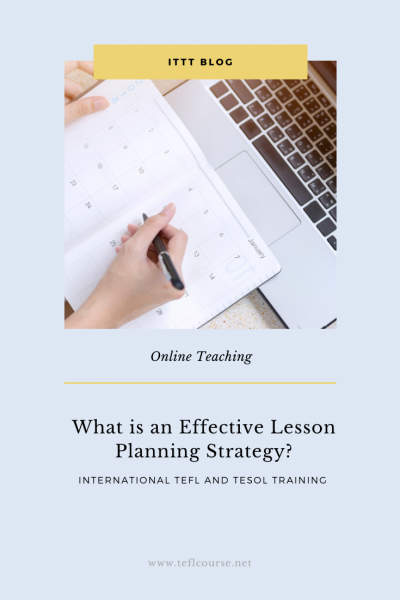What is an Effective Lesson Planning Strategy?

The lesson plan is every teacher's road map to effective learning. An effective lesson plan should pre-answer, what to teach and how to teach. So, how do we create an effective lesson plan that will pave the way to a successful teacher-student interaction? In the next few paragraphs, we will be looking at guidelines on how to prepare a lesson plan and discuss the importance of lesson planning.
This post was written by our TEFL certification graduate Woinshet A. Please note that this blog post might not necessarily represent the beliefs or opinions of ITTT.
There are numerous ways teachers can prepare or write lesson plans. Some prefer to have a detailed plan while others will just go for simple jot notes. Even though there isn't one outline that fits all and it's up to the teacher to find his/her ways of styles but an effective lesson plan will have to address and integrate the three main components:
Learning objective
This will be what you expect the students to learn or gain out of the lesson being thought. It could be taken from the curriculum guide. An example of a lesson on the verb, upon completion Students able to define and identify action verbs and able to construct sentences using the correct action verbs. Developing their vocabulary.

Also Read: Are there any age limits for TEFL teaching?
Learning activities
This should be directly related to the learning objectives. Think of different activities and methods that will help students grasp the lesson objectives and develop deep knowledge and understanding of the topic. We can use different activities to engage students like games, student presentations, quizzes and so on.
Further example with the verb lesson: Students will engage in a short physical exercise: whereby students will act the verb as I name a few, eg (stand, stretch …) Look at typical verbs of movement by using pictures/ diagrams of animals. Ask students what they see on the Picture and they are to make a sentence what the animal on the picture is doing. Play charades.
Assessment
This will help you to find out if the students understood the concept and what they have learned. It also gives you ideas or guidelines for further learning. And allows students to demonstrate the knowledge and skills they have gained. Your assessment could be formative or summative in the form of classwork, homework or even a question-answer session. Example with the verb lesson: students will complete worksheets; in which students will have to underline the verbs in the sentences.
In addition to these components, a lesson plan should be simple and structured with a balance of skills with activities that fit together to give the lesson a smooth flow. Bear in mind an effective lesson plan is flexible and open to adaption.

Also Read: 7 Important Questions about Business English
Why is important to have a lesson plan?
Lesson plans do have several important functions. An effective lesson plan increases teacher's confidence which results in a successful learning outcome. Mostly without a well-planned lesson, students will likely lose interest and focus. Having a well-planned lesson plan gives you ideas to teach in a fun and creative way and will boost your confidence that will help you to interact and engage with the students confidently, and in return, these will keep the students interested, motivated and wanting to know more.
A lesson plan could also be used as auditing purposes by schools to see what the students have been learning and if the lesson is going with the curriculum (annual plan). It also acts as a record of the lesson and materials you have already used to avoid repetition. In addition to these, a well-planned lesson plan will guide a substitute teacher on what to teach in your absence.
Also Read: Adapting to the Differences Between Group Teaching and One-to-One Teaching
Do you want to teach English abroad? Take a TEFL course!
In conclusion, a lesson plan will guide teachers on what they need to teach and alert students what is their responsibility as a learner. Always remember, an effective lesson plan is not one on which everything goes according to the plan but it's the one that is flexible enough to accommodate the students’ needs and the one that both students and teachers able to learn from each other. Thanks to technology in this day and age, having a lesson plan is just a click away. There sites that you can download already made lesson plans from or even modify it and adapt it to your student's need. One other way to do your lesson plan is to collaborate with other teachers.
Apply now & get certified to teach english abroad!
Speak with an ITTT advisor today to put together your personal plan for teaching English abroad.
Send us an email or call us toll-free at 1-800-490-0531 to speak with an ITTT advisor today.
Related Articles:
- 7 Fun Activities for Teaching Vocabulary in the ESL Classroom
- 10 Questions You Need to Ask Before Enrolling In a TEFL Course
- Teaching English In China - The Salary and Budget Guide
- Online or In-Class - Which TEFL Course Should You Take?
- Teaching English Abroad: What's Next? - How To Advance In Your EFL Career




